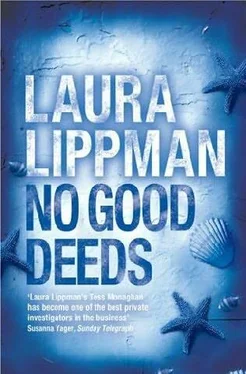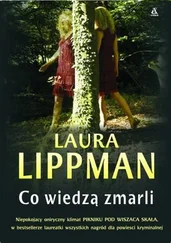“You didn’t.” Jenkins tried to make his tone sound admiring, but he was actually thinking, What a stiff-necked little prick.
Ah, well. That just made him even more perfect for the task at hand.
“Miss Monaghan?”
Tess was used to being accosted anywhere, anytime in Baltimore, her personal and professional identities forever overlapping. Relatives crashed meetings with clients when she was foolhardy enough to conduct her affairs in public places, while those who knew her through her work had no qualms about confronting her during obvious downtime. Once, a disgruntled city official, unhappy with the effect that Tess’s research had on his divorce settlement, kept up a running commentary on her ethics during a screening of Lawrence of Arabia . He had finally been led out of the Senator Theater by two young ushers, still hissing invectives all the way-“Bitch! Whore! CUNT!”-while Tess stared straight ahead, trying to lose herself in the restored glory of Peter O’Toole’s gaze.
Still, it was disconcerting to have someone address her formally while she was naked except for Jockey underwear.
“Yes, that’s me,” she said, pulling on her bra and T-shirt as quickly as possible.
“I’m sorry to bother you, but you looked too, um, focused to interrupt on the gym floor. I’m Wilma Youssef.”
The first irrelevant thought that crossed Tess’s mind was, But you’re so blond. Silly, she had imagined Youssef’s wife more as a sister-dark-haired, dark-eyed, olive skin. The woman standing at the end of this row of lockers was a petite, blue-eyed blonde. Tess’s second, still-not-on-point reaction was, You’ve kept your face out of the news. Gregory Youssef’s image may have been as ubiquitous as the girl on the Utz potato chip bag, but his wife had managed to stay off camera, no small feat for a grieving widow.
Then, finally, an almost appropriate observation: What did one say to a notorious widow? What did one say to a widow who almost certainly believed that you were an obstacle in her husband’s murder investigation?
“Hi,” Tess said, offering her hand, once her T-shirt was in place. Mrs. Youssef declined to shake.
“I really need to talk to you, but I don’t have much time. My mother-in-law spells the nanny at day’s end, but I hate to impose on her longer than necessary. Can we speak in the café upstairs?”
Tess made a face. There was nothing wrong with the bar-restaurant in the Downtown Athletic Club, but gym was like church to her-a sacred place, yet not one where she wanted to linger once her ablutions were done.
“The Brass Elephant is just a few blocks away. Could we have a drink there?”
“Oh, yes. That bar you like so much.”
“How do-”
The widow Youssef’s smile was at once sad and superior. “We’ve been making quite a study of you. Do you think it’s a coincidence that I’m at this particular gym at this particular hour? I don’t exactly have time to work out.”
Tess wasn’t sure what was more unnerving-the idea that someone could so easily discern her patterns or the woman’s use of the first-person plural. Who was this “we,” exactly?
“I can be there in five minutes,” she said. “It’s not a bar that stands on formality, but it does prefer that the patrons wear something below the waist.”
It wasn’t clear if Wilma Youssef understood that this was a joke or if she simply didn’t see the humor in anything. She gave Tess a chilly smile and nodded her assent.
“Club soda,” Wilma Youssef told the bartender.
“Nursing?” asked Tess.
“Yes, but I never drank. Neither did Greg. We met through a Christian fellowship group at Cornell.”
The information seemed at once pointed and defensive to Tess, but all she said was “Oh.” And then to the bartender, “I’ll try that weird gin drink you make, the one with peach schnapps. Maybe it will make me feel as if spring is on the way.”
“We’re not what people mean when they speak of the religious right,” Wilma said, picking up on Tess’s unvoiced skepticism. “But we were conservative by most people’s standards. Didn’t drink or use drugs. We also happen to believe that homosexuality is a sin. So I always knew that Greg’s death was not as it appeared. Nothing could make me believe that .”
Funny, the Christian fellowship stuff was the one piece of information to date that made the scenario more plausible to Tess. She wondered if Youssef’s killer had known this and factored it in.
“When the story with the new information ran in the Beacon-Light , I was so hopeful. At first. I thought it meant that Greg’s killer had been found and the truth would finally come out. But now police tell me that you’re determined to shield the killer.”
“Not the killer. Just a-” Ever vigilant, Tess stopped herself short of using Lloyd’s gender. “Just an individual who was holding a piece of the puzzle, unawares.”
“Some lowlife.”
“Is that part of your doctrine, too? Assigning people their value on earth?”
Nothing seemed to shake Wilma Youssef’s eerie poise.
“I’m a widow with a three-month-old child. A boy who will never know his father. It’s important to me that Greg’s name be cleared.”
“It seems to me that it has been. We still may not know who killed him, but it seems more likely now that it had something to do with his work, right?”
She chewed a piece of ice. Tess wouldn’t be surprised to learn that the Widow Youssef subsisted solely on ice.
“I received something…unexpected,” she said, once the ice cube had been crunched into oblivion beneath her small, perfect teeth.
“What?”
“I prefer not to say.”
“I won’t tell anyone.” The woman clearly wanted to confide in someone. Perhaps she had been drawn to Tess in part because she thought Tess owed her that much. “If you know anything about me, it’s that I keep my promises, that I’m willing to go to extraordinary lengths to do just that.”
“I can’t say.”
“Which is it? Don’t want to or can’t?”
“Both. I don’t know what this thing means. I don’t want to know, because then I can say I didn’t know, if someone else finds out. Greg had…” In Wilma’s pause, Tess supplied a thousand possibilities, an array of wonderful and intriguing nouns. It was a bit of an anticlimax when Wilma Youssef finally said, “A safe-deposit box.”
“So? Lots of people do.”
“This one was secret, kept in a bank down in Laurel, quite a distance from where we live. I wouldn’t even have known it existed if the renewal paper hadn’t arrived in the mail last month. Apparently the bank doesn’t even know he’s dead.”
“That’s awful,” Tess said, meaning it.
Wilma sighed. “You get used to it. Almost. The telemarketers that call and ask for Mr. Youssef-they don’t even lose their place in the script when I say, ‘He’s dead.’ They just plunge ahead, telling me about the new ‘products’ available on my charge cards.”
Wilma Youssef was making it awfully hard to out-and-out loathe her. Her values may not have been Tess’s, but her situation engendered sympathy. All the more so because she didn’t seem to expect it.
“Well, if you need help getting access to it, that can be accomplished pretty quickly through probate. I know some lawyers-Well, you know some lawyers, obviously. I’m sure there are ways to expedite.”
“I don’t have a key.”
“Still, there has to be a way-”
“I didn’t come to you for legal counsel. I’m not worried about straightening out Greg’s estate.”
“What are you worried about?”
Читать дальше












